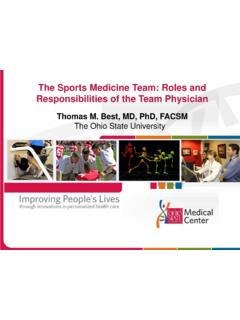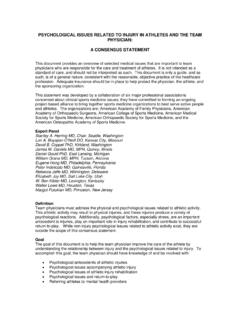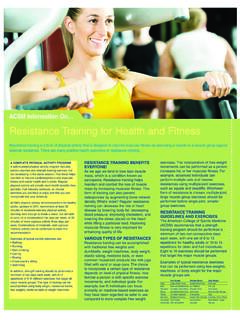Transcription of Basic Nutrition for Athletes 2 - American College of ...
1 12/10/20121 Basic Nutrition for AthletesTeam Physician Course Feb 2013 Heather Gillespie, MD, MPHA ssistant Professor, UCLATeam Physician, UCLA AthleticsObjectives Review the role and importance of optimal Nutrition in physical activity, athletic performance and recovery Review general energy metabolism and the role of energy balance in athletic performance Review current recommendations regarding macronutrient (carbohydrate, fat and protein) ingestion for training, competition and recoveryOptimal Nutrition Nothing basicabout Veryindividualized Goal dependent ComplexVariation in Nutrition Requirements Type of exercise Intensity of exercise Duration of exercise Weight/body composition challenges Age/sex Training/competition schedule Goals?
2 Travel and time zone changesBasic Nutrition Goals Energy intake to meet the demands of training Replenishment of muscle and liver glycogen with dietary carbohydrates (CHO) Proteinintake for growth and repair of tissue, particularly muscle Overall diet ( , proteins, antioxidant vitamins) to maintain a healthy immune system HydrationEnergy BalanceDietary energy intake -Exercise energy expenditure= Energy Availability12/10/20122 Nutrients that give us energyCarbohydratesFatsProteinsGlucoseFr ee Fatty acidsAmino AcidsDigestion Three Major Energy SystemsATP and Energy Use by MuscleEnergy BalanceDietary energy intake -Exercise energy expenditure = Energy Availability Consume adequate energy to maintain body weight and health and maximize training effects Negative energy balance can result in.
3 Loss of muscle mass Menstrual dysfunction Loss or failure to gain bone density Inc risk of fatigue, injury, illness Prolonged recovery processNew Female Athlete Triad Diagram?New Female Athlete Triad Diagram?12/10/20123 Adequate Energy Needs Variation! Male endurance Athletes : 3000-5000 kcal/day Female Athletes with energy intakes < 1800-2000 kcal/day at risk Majority additional energy needs supplied as CHOBody Weight and Composition Ideal Body Composition? No valid scientific rationale Better to define a range of values, and monitor both health and performance Limitations of current methods May precipitate disordered eating behaviorsBody Weight and Composition Should not be a criterion for sports performance Frequent weigh-ins discouraged Optimum body fat level dependent on age, sex, heredity and may be sport specificBody Weight and Composition Assessment techniques have variability and limitations Weight loss should take place in off season and involve sports dietician If weight (fat)
4 Loss is required, it should start before the competitive season and involve a trained health and Nutrition professionalBasic Nutrition CARBOHYDRATES PROTEINS FATS MICRONUTRIENTS VITAMINS AND MINERALS WATERC arbohydrates Maintain blood glucose during exercise Replenish muscle glycogen after glycogen-depleting exercise As exercise duration increases, carbohydrate needs rise12/10/20124 Carbohydrates Carbohydrate needs increase particularly during: periods of high intensity training w/ few rest days multiple workouts/day tournaments with multiple games per day 6-10 g/kg/day ( g/lb) Dependent on energy expenditure, sex, sport, and environmental conditionsProtein Maintain and build muscle mass Repair and rebuild muscle tissue Maintain immune function Fluid balance Hormones EnergyProtein Recommendations General recommendation: g/kg/day Sport-based recommendations.
5 Recreational Athletes g/kg/dayEndurance Athletes g/kg/dayUltraenduranceathletes g/kg/dayStrength Athletes g/kg/dayFats Source of energy Fat soluble vitaminsA, D, E, K Essential fatty acids Should be < 30% of normal diet (<10% saturated fat) No evidence high-fat is ergogenic Fat provides 70% of energy at rest Fat supports vital organs, insulates and preserves body heatDietary Fat Recommendations Dependent on energy needs Higher energy expenditure higher fat needs Most Athletes require ~ g/kg/day 20-35% of total calorie intake Endurance Athletes Up to g/kg/day Ultraenduranceathletes Some reported to consume up to g/kg/dayDietary Fats Primarily monounsaturated and polyunsaturated Monounsaturated fats:olives, oils, nuts, avocadoes Polyunsaturated fats.
6 Fish, fish oil, flaxseed, walnuts, some oils <10% of total calories should be from saturated fat12/10/20125 Micronutrients Most common vitamins and minerals of concern in Athletes diets: Calcium, VitD B vitamins Iron Zinc Magnesium Antioxidants: C, E, beta carotene and seleniumMicronutrients Vitamin and mineral supplements not needed if proper foods consumed Supplements may be needed in Athletes who: Restrict energy intake Use severe weight loss practices Eliminate food groups from dietThe Training Fluid to maintain hydration Low in fat Low in fiber Facilitate gastric emptying and minimize gastric distress High CHO to to max maintenance of blood glucose Moderate protein Familiar foods to athlete Carbohydrate (g)
7 Before training/competition 1-4 gm/kg 1-4 hours prior If unable to eat breakfast before an early-morning workout, eating ~30g easily digested carbohydrates 5-15 minutes before exercise may improve performanceGrams/kgGrams/lb150 lb 1 hr 2 hr hr hr priorCarbohydrate Before ExerciseDuring Exercise Replace fluid loss Provide CHO for maintenance of BG levels Especially when: exercise > 1 hr inadequate pre-exercise intake extreme conditions Consumption in 15-20 min intervals better than 2 hour bolus Addition of protein inconclusive on performance12/10/20126 Carbohydrates During Exercise Sport drinks, energy bars, fruit, breads For long-duration, moderate to high intensity exercise Consume 30-60 grams per hour (~1 gram/minute) Dilute concentration (<10%) may be advantageous by optimizing fluid absorption/deliveryAfter Exercise Provide adequate fluids and energy.
8 Replace muscle glycogen stores Ensure rapid recovery With protein, aids in the repair of muscle tissue after training/competition. Recovery Nutrition most important for:- Athletes training intensely on a daily basis- Athletes with more than one competition or workout in a day-after a major event or competition Recovery snack should be consumedimmediately after exercise (within 30 min.) Again q2H for 4-6 hours grams per kg (~ g/lb)Weight Lbs 110125155170Kg 50577077 Carb(g)50-6057-6870-8477-92 Carbohydrate AfterExerciseProtein + CarbohydrateRole of Protein Ingestion During Recovery from Exercise: Studies assessing the addition role of protein (in a CHO + PRO mixture) to enhance muscle glycogen resynthesisare inconclusive However, protein added to a CHO recovery drink may aid in the repair and synthesis of muscle protein after endurance exercise Recommended (post-exercise): CHO g/kg/hour, PRO g/kg/hour Ex.
9 Low-fat chocolate milk convenient, inexpensiveRecovery FoodsFood ItemServing SizeCarbohydrate (g)Protein (g)Orange juice16 (4 oz)608 Chocolate milk16 Smoothie10 bar14510PB & J sandwich14512 Cereal & milk1 cup Athletes May be at risk for low energy intake Low protein, fat intake Low micronutrients: Iron, calcium, VitD, riboflavin, zinc, B-1212/10/20127 Summary Carbohydrates, Fats and Protein all play an important role in the Athlete Diet Importance of Energy Balance Individualized Nutrition Requirements Variation due to type, duration, and frequency of activity;age, sex, environment Training Diet = Before, During and After ExerciseReferences Position of the American Dietetic Association, Dieticians of Canada, and the American College of sports medicine : Nutrition and Athletic Performance, J Am Diet Assoc.
10 2009; 109:509-527.




